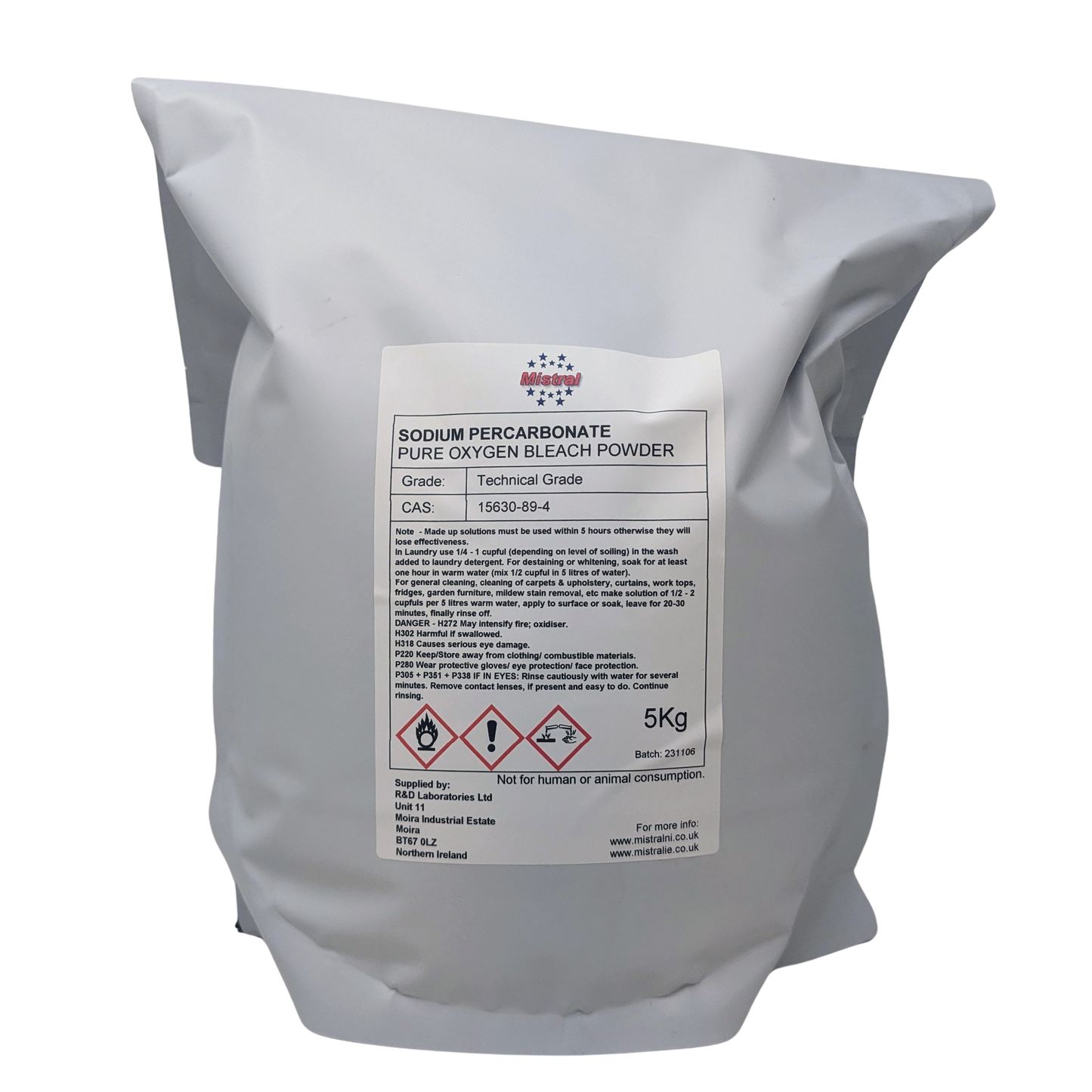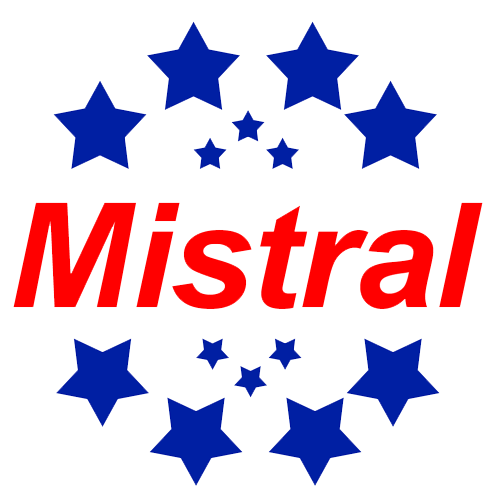
SODIUM PERCARBONATE
Oxygen Bleach
Technical Grade - Coated
In the UK and Ireland Sodium percarbonate, also know as Sodium Carbonate Peroxyhydrate, or oxygen bleach is a free-flowing, white powder. It is an addition compound of sodium carbonate and hydrogen peroxide. Percarbonate has an active available oxygen content (13%) which is equivalent to 27.5% Hydrogen peroxide. It breaks down to oxygen, water and sodium carbonate upon decomposition. It is an environmentally safe bleaching agent. Sodium Percarbonate / oxygen bleach offers many of the same functional benefits as liquid hydrogen peroxide. It dissolves into water rapidly to release oxygen and provides powerful cleaning, bleaching, stain removal and deodorizing capabilities in addition to being effective at killing bacteria, fungus, viruses and algae. It has the added advantage of having no odour.
Other Names: PCS, sodium percarbonate, solid hydrogen peroxide, Sodium carbonate hydrogen peroxide, sodium carbonate peroxyhydrate, oxygen bleach
PLEASE NOTE: This product is not for human or animal consumption.
Uses for Sodium Percarbonate / Oxygen Bleach
Sodium percarbonate improves the performance of conventional detergents and shampoos on stubborn stains. It is a gentle stain remover for synthetic carpeting and upholstery fabrics. It saves time by allowing cleaning in one pass that would perhaps have taken two or three passes with a carpet cleaner that uses shampoo only. It improves personal safety by eliminating the need to use harsher cleaning or stain removal products. It also eliminates the need for expensive prespotters and stain removers. It prolongs carpet cleaner machine life by reducing the use of harsh and corrosive products. It is very effective as a laundry presoak for heavily stained articles. It is colour safe. It brightens colours and prevents fabric from become yellowed or darkened.
On wood it is effective in removing mildew stains and weathering. The sodium carbonate acts as a built-in detergent, removing dirt and other deposits. Thus, sodium percarbonate-based cleaners are effective in removing dirt, mildew and weathered grey residues. Once treated the wood returns to its natural original appearance. Oxygen bleach is excellent for cleaning and removing organic stains (such as coffee, tea, wine, fruit juices, foods, sauces, grass, pet stains and blood) from fabrics, plastics, fiberglass, porcelain, ceramics, wood, carpets, asphalt, concrete, etc. Oxygen bleach containing products can be used in any place in or around the house that need to be destained and deodorized; they are efficient, safe and economical.
Benefits:
- No environmental hazards - breaks down to oxygen, water and sodium carbonate (soda ash) in your wash water.
- Effectively kills wide range of bacteria, mould, algae, viruses, fungi
- Colour safe and fabric safe. It brightens colours and prevents fabrics from becoming yellowed or darkened
- Effective stain removal on a multitude of surfaces
- In the laundry Sodium Percarbonate is used to destain, deodorize, and whiten. It is very effective as a laundry presoak for heavily stained articles.
Where to use:
- Laundry cleaner & bleach
- Spot cleaning fabrics
- Carpet & Upholstery cleaning and prespotting
- Kitchen surfaces and utensils
- Destaining cups, Coffee Pots etc
- Fridges & freezers
- Chopping Boards
- Bathroom surfaces
- Mildew Removal tiles, grouting and walls
- Wood Decks and wooden garden furniture
- Plastic garden furniture
- Kills algae and moss on driveways, patios, brickwork and roofs.
- General household Cleaning
- Sterilizing utensils in hairdressers and barbers
.......etc etc etc
How to use sodium percarbonate / oxygen bleach:
Dilution rates for sodium percarbonate / oxygen bleach:
5g = 1 heaped teaspoon 30g = 1/4 cupful 60g = 1/2 cupful
How to use oxygen bleach for Laundry Applications: For light soils add 30g of Sodium Percarbonate / oxygen bleach with your laundry detergent per load. For moderate soils use 60g (1/2 cupful) and for heavily soiled articles use 120g. In the laundry Sodium Percarbonate is used to destain, deodorize, and whiten. It is very effective as a laundry presoak for heavily stained articles. Soak in hot water for at least 30 minutes, or overnight, then complete wash cycle. For whitening old linens and yellowed window shears, deodorizing and cleaning tennis shoes, or to get rid of yellow armpit stains on shirts: soak in a solution containing 60g of Sodium Percarbonate in 5 litres of water for at least one hour, or overnight, then rinse.
How to use oxygen bleach for For general cleaning: Dissolve 25g per litre of warm/hot water For Heavy cleaning: Dissolve 60g per litre of warm/hot water Soaking: Dissolve between 15g and 60g per litre of warm/hot water To make a paste mix 30g of powder with just enough warm water that the paste forms.
How to use oxygen bleach as a Carpet Prespotter / stain remover: Add 30g per litre of water. apply to stain ensuring that it is well soaked. Leave for up to 10 minutes. Lift residue with white paper towelling. Repeat cleaning if necessary. After carpet has been cleaned rinse with clean water and absorb with towelling. repeat rinsing.
How to use oxygen bleach for Kitchen Cleaning: For general cleaning and deodorising of work surfaces, fridges, floors, walls etc use 25g per litre of water. Apply to surface by spraying, mopping or wiping. Allow to remain on surface for 5-10 minutes and rinse off.
How to use oxygen bleach for Cleaning Decks: Dissolve 50-60g of sodium percarbonate / oxygen bleach per litre of warm/hot water. Each litre will clean approx 5m2 of surface. Brush decking first to remove all loose debris, leaves, rubbish etc. Apply solution to the surface and allow to work for 30-60 minutes, scrub with stiff brush and rinse off. For stubborn stains futher applications will be necessary.
How to use oxygen bleach for Mould & Mildew Removal: Dissolve 60g of sodium percarbonate per litre of warm/hot water. Apply to surface and allow ro remain for 30mins to 1 hour. agitate with a soft brush and rinse thoroughly. Please Note: There are many types of moulds and although sodium percarbonate is effective against many of them it will not be effective against all of them and we cannot guarantee success.
How to use oxygen bleach for Destaining: Soak items in a solution containg 60g per litre of water. Leave for 15-20 mins. Remove and rinse thoroughly.
How to use oxygen bleach for Cleaning Machines: make up a solution of 25g dissolved in 1 litre water. Switch on Machine and pour in the solution and allow it to circulate. drain off solution. Rinse thoroughy by circulating clean water through the machine.
Pre-mixed solutions Of Sodium Percarbonate / oxygen bleach will remain active for 5 to 6 hours, after which they should be discarded. Unused material may be poured down the drain or into a septic tank. It will actually help clean and deodorize your pipes, drains, toilets etc. Sodium percarbonate solutions are most effective when mixed and used in warm to hot solutions (30o to 60o C).
Water Treatment using Sodium Percarbonate:
Sodium percarbonate is a quick oxygen-releasing agent, it can release a large of oxygen into water and increase the oxygen concentration of water for a long period of time. At the same time, it can improve the water quality and degrade the organic matter of water to reduce the toxicity of ammonia, nitrogen, H2S and algae. Applications for sodium percarbonate include treatment of biological upsets in ponds, treatment of sludges, municipal sewage treatment, dechlorination and water softening. In sewage treatment SPC helps to reduce the chemical oxygen demand and improve biodegradability. It neutralises pollutants such as sulphides, nitrosamines, amides, chlorine and thiosulphate. NB. Not for use in drinking water.
Uses of Sodium Percarbonate in the Textile Industry:
Sodium Percarbonate is used as a method of adding hydrogen peroxide to dye oxidation baths in order to fix the dye onto the fabric. SPC is used as the bleaching agent to improve fabric whiteness.when a solid bleach is desirable. It also offers a system for the fixation of sulphur dyes on fabrics. Sodium Percarbonate is not suitable for use with silk or wool.
Sodium Percarbonate in the laboratory:
Sodium percarbonate is a source of highly concentrated hydrogen peroxide in non aqueous systems. It is useful for solvents that cannot dissolve the carbonate but leech out the hydrogen peroxide from it. It behaves as an electrophile, because the driving force is the formation of carbonate. At room temperature solid SPC has the orthorhombic crystal structure.
sodium percarbonate allows the convenient preparation of peroxyacids from acid chlorides, and even from the acids themselves. Thus, Sodium percarbonate can be used in epoxidations and Baeyer-Villiger oxidations in the presence of an acylating agent.
Sodium percarbonate in trifluoroacetic acid is an effective reagent for the Baeyer-Villiger oxidation of ketones to esters.
The oxidation of primary and secondary alcohols by sodium percarbonate in the presence of catalytic amounts of both molybdenyl acetylacetonate and Adogen 464 gave fair to high yields of the corresponding carbonyl compounds.
Sodium percarbonate is an ideal and efficient oxygen source for the oxidation of tertiary nitrogen compounds to N-oxides in excellent yields in the presence of various rhenium-based catalysts under mild reaction conditions.
